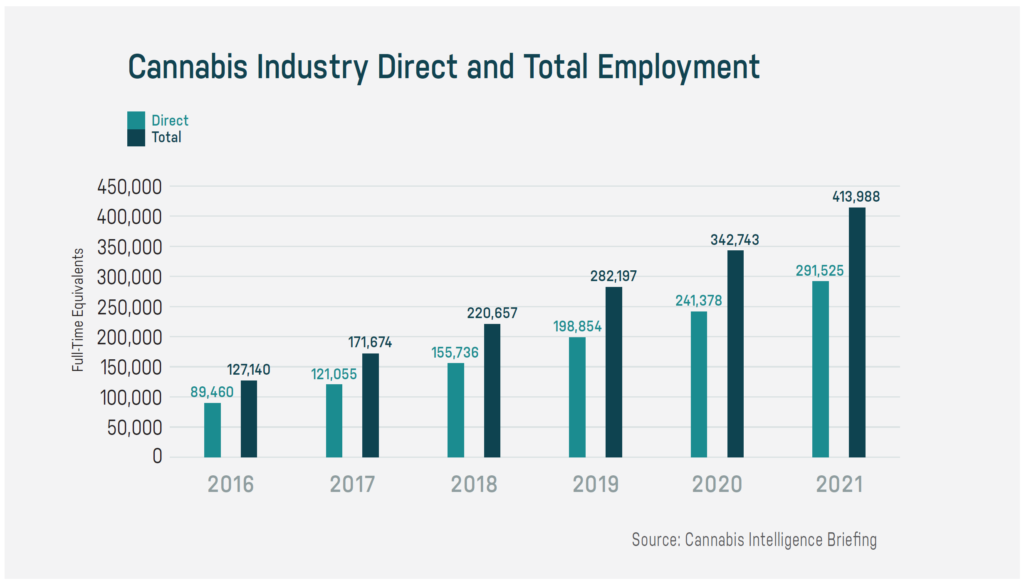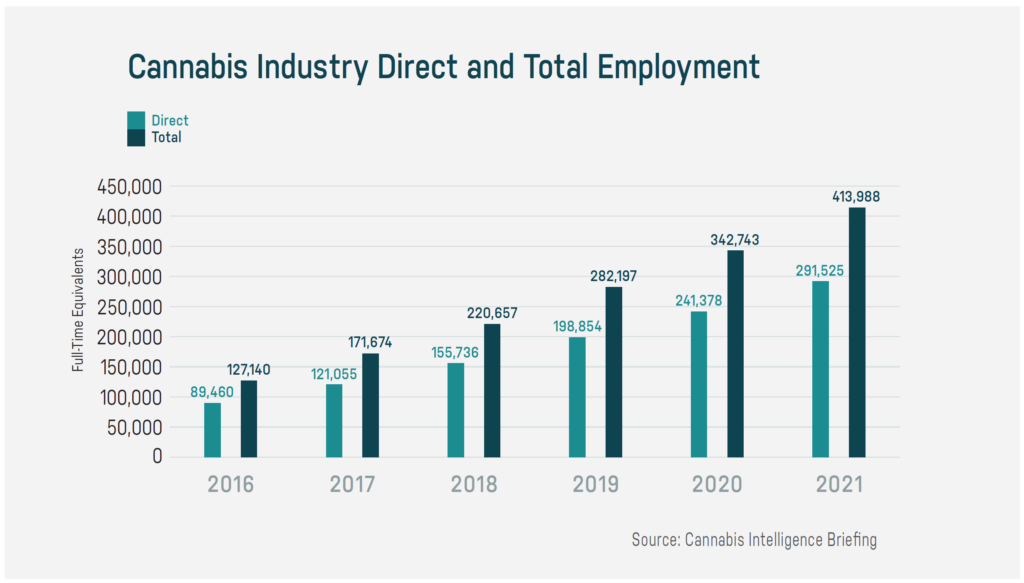4/20 and Policy: A Week to Remember

 by Madeline Grant, Government Relations Manager
by Madeline Grant, Government Relations Manager
There is excitement in the air as we approach April 20; what we recognize as a national holiday for cannabis culture. The 2022 National Cannabis Festival will take place this Saturday, April 23 in Washington, D.C. Prior to a full day of music, vendors, and many more fun surprises, the National Cannabis Policy Summit will be held Friday, April 22 at the Ronald Reagan Building, also in D.C.
NCIA’s very own Deputy Director of Government Relations, Michelle Rutter Friberg, will give opening remarks to introduce the “Banking on Incrementalism: How and Should Congress Pass the SAFE Banking Act?” panel. Our long-time cannabis champion on Capitol Hill, Congressman Ed Perlmutter (D-CO), will present a special message to all attendees. If you want to tune in, please stay tuned for a link on one of NCIA’s social media platforms.
The panel will discuss the Secure and Fair Enforcement (SAFE) Banking Act and how it made history when it became the first stand-alone “pro-cannabis” bill to pass in a chamber of Congress in September 2019. Since that day, the House has passed the bill an additional five times, but the Senate, under both Republican and Democratic leadership, has refused to consider the legislation for various reasons. Support for SAFE Banking is evident through numerous allies, including dozens of Governors, states Attorneys General, Auditors, and Treasurers from both parties as well as bankers, unions, and advocates. Despite widespread bipartisan support, pro-reform critics of the SAFE Banking Act worry that its passage opens the floodgates for existing licensees to expand operations while not going far enough to ensure equity and meaningful criminal justice reform.
Additionally, with the recent news of the long-anticipated Senate bill to federally legalize marijuana, the Cannabis Administration & Opportunity Act (CAOA) not being introduced this month, frustration continues to grow among advocates. A discussion draft of CAOA was first unveiled last year; however, Senator Schumer said last week that he and colleagues were in the process of reaching out to Republican senators to “see what they want” included in the legislation. The extended time frame is intended to finalize the measure, helping the senators overcome what are currently significant odds stacked against them to reach a high vote threshold in the Senate chamber. The “official introduction” will take place sometime “before the August recess,” according to a press release from Senator Schumer’s office. Stay tuned for more updates from the NCIA Government Relations team.
As NCIA continues to work to get legislation to the finish line, it’s important to build support on incremental and comprehensive bills with the House and Senate offices. From our VIP Virtual Lobby Days with NCIA’s Evergreen members to providing congressional offices industry reports and data, we work as a resource to support and educate Capitol Hill. Furthermore, events centered around cannabis policy, such as the National Cannabis Policy Summit, help to illustrate the crucial importance of cannabis policy reform. Thanks to members of the National Cannabis Industry Association, we can continue to lobby on behalf of small cannabis businesses and move positive cannabis policy reforms in Congress. Although we can’t all be together this year for NCIA’s Annual Cannabis Business Lobby Days, stay tuned for updates for NCIA members to participate virtually. If you’re interested in learning how to get more involved in NCIA’s policy work please reach out to madeline@thecannabisindustry.org.
SAFE Banking Act To Receive Full Committee Mark-Up

Big news! The recently introduced Secure And Fair Enforcement (SAFE) Banking Act, will receive a full committee markup next Tuesday. A markup is the process by which a congressional committee debates, amends, and rewrites proposed legislation.
At the beginning of a markup, committee members first make opening statements. Then, the bill is read for amendment, one section at a time, with committee members offering their amendments to each section after it is read but before the next section is read. Committees do not change the texts of the bills they mark up. Instead, committees vote on amendments that their members want to recommend that the House adopt when the House considers the bill on the floor.
If you remember, HR 1595: the Secure and Fair Enforcement (SAFE) Banking Act was just introduced in the House of Representatives by Reps. Ed Perlmutter (D-CO) and Denny Heck (D-WA) less than two weeks ago. In a stunning, historic surprise, the legislation was introduced with a whopping 108 original cosponsors, and that number has already risen to 138.
As a refresher, the SAFE Banking Act would prevent federal banking regulators from punishing banks for working with cannabis related businesses that are obeying state laws or halting their services, taking action on loans made to those businesses, or limiting a depository institution’s access to the Deposit Insurance Fund. The bill would also protect ancillary businesses that work with the cannabis industry from being charged with money laundering and other financial crimes, and requires the Financial Institution Examination Council to develop guidance to help credit unions and banks understand how to lawfully serve cannabis businesses.
Draft legislation of the SAFE Banking Act received a historic hearing in the House Consumer Protection and Financial Institutions Subcommittee last month. NCIA submitted written testimony along with the personal stories about the burdens and safety concerns created by the current banking situation from nearly 100 cannabis industry professionals.
Interested in helping with these efforts? You can:
– Call your representative and ask them to cosponsor the HR 1595: the SAFE Banking Act. If they’re already a cosponsor, thank them for their support. You can find out how to contact your member of Congress and find some helpful tips here.
– Attend one of NCIA’s upcoming Cannabis Caucus events to get an in-depth federal policy update — register here.
– Make sure you’re planning to attend NCIA’s 9th Annual Cannabis Industry Lobby Days, being held in Washington, DC May 21-23, 2019!
America’s Own Homegrown Industry

Co-authored by NCIA and BDS Analytics
It all begins with the humble plant.
The fastest-growing industry in the United States relies 100 percent upon the simple cultivation and harvesting of one plant, cannabis sativa — its buds, its leaves, and the diversity of organic compounds the plant provides, including THC.
If the plant is grown indoors, as is most legal cannabis in the United States, it first needs a building before it ever digs roots and spreads a canopy. The building requires complicated lights, many of which are manufactured in the United States. It demands a wilderness of HVAC networks, to maintain a healthy temperature and humidity level. Irrigation systems, potting soil and soil amendments, complex sprinkler systems in case of fire, high-tech security systems — all of these and much more must be in place before the first plant begins to rise towards the light.
And these first steps produce jobs and work: real estate professionals, lawyers, accountants, bookkeepers, electricians, carpenters, plumbers, HVAC specialists, irrigation experts, sprinkler and alarm installation technicians, factory workers. Once the building is ready, the company needs horticulture experts and trimmers, among others. And it requires ongoing work, too, from electricians and other trades specialists, as things break and need to be replaced or updated. The cultivation of the plant alone is a rapidly-developing career field.
But hands-on growing represents just one small patch of the cannabis landscape. Every step along the way, from seed to store, propagates work for people in hardhats, lab coats and blazers. And all of the jobs are Made in the USA. Even more, due to the patchwork regulatory environment, cannabis industry jobs also tend to root, and stay put, within individual states and communities.
Legal cannabis today in the United States is the ultimate homegrown industry. Detailed sales data from industry market research firm BDS Analytics reveals astounding growth within states where cannabis is legal. For example, during the first quarter of 2018 in Colorado, where sales of recreational cannabis have been legal since 2014, dollar sales of concentrates in recreational shops grew by 47.4 percent compared to the first quarter of 2017. Concentrates do not represent a tiny piece of the overall recreational marketplace: During this year’s first quarter, adult use concentrates sales hit $85.35 million, and captured a full 30 percent of the recreational marketplace. That’s an enormous chunk of the state’s mature adult use cannabis market, and yet sales still expand by close to 50% within a year.
And with all of that growth, quarter after quarter, comes increased need for workers.
States with laws that replace criminal marijuana markets with regulated industries are also benefiting from significant tax revenues that support important programs like school construction, law enforcement, and drug education. According to the National Cannabis Industry Association’s , the five states that allowed adult-use sales realized nearly $800 million in combined state tax revenue alone.
Industry investment and market research firms The Arcview Group and BDS Analytics predicted in their study US Legal Cannabis: Driving $40 Billion Economic Output that the industry will hatch 414,000 jobs in a multitude of fields both directly and ancillary related to cannabis by 2021 — everything from delivery drivers to retail sales pros to extraction technicians, warehouse workers, bakers, marketing gurus, and PhDs in pest control.

The industry’s impact is certainly felt in Colorado, which began retail cannabis sales for adult use on Jan. 1, 2014 — the first in the nation to do so. Many economic experts attribute the state’s lowest-in-the-nation unemployment rate, at least in part, to the cannabis boom.
Colorado’s ascending sales results, as well as those in the other cannabis-legal states, would likely resound with even more oomph if two difficult issues could be resolved: banking, and the ability to write off business expenses for cannabis companies.
As the industry’s leading national advocate, NCIA is working hard on both fronts.
The Small Business Tax Equity Act of 2017, co-sponsored by Rep. Carlos Curbelo (R-FL) and Sen. Ron Wyden (D-OR), seeks to let cannabis companies operating legally under state law to implement business-related tax credits or deductions for expenses — the entire issue is often referred to simply as 280E (the applicable section of the tax code) as shorthand. For now, the federal government treats marijuana sales in legal states the same way it treats sales of illegally-trafficked drugs — needless to say, people illegally selling controlled substances cannot itemize tax deductions or claim business-related tax credits but NCIA believes that state-licensed businesses should not be caught up in the wide net cast by 280E.
Meanwhile, the Secure and Fair Enforcement (SAFE) Banking Act seeks to provide a “safe harbor” and additional protections for depository institutions that want to engage with cannabis companies that are in compliance with state law. Rep. Ed Perlmutter (D-CO) and Sen. Jeff Merkley (D-OR) are co-sponsors of this important legislation, which finally would, among other things, provide cannabis companies access to bank loans — taken for granted in most industries, but long outlawed in legal cannabis.
The success of the industry truly astounds despite such profound roadblocks. Success in alleviating such banking and taxation headaches would further stoke what is already the hottest industry in the country.
Research into the economic benefits of cannabis legalization and regulation is just beginning, and for now it remains too early to make definitive declarations about how legalization will influence the economic path of different communities. Undoubtedly the effects will vary from location to location — the effect on San Francisco, for example, may be entirely different from the effect on Fort Collins, Colorado.
One early study, conducted by the University of Colorado-Pueblo’s Institute of Cannabis Research, found that legalization in Pueblo, a diverse, blue-collar area about two hours south of Denver, could be responsible for the County’s recent success. In addition, the study rejected predictions that legalization would bring increased homelessness and crime to the region.
“When compared to similar communities in states where cannabis is not legal in any form, Pueblo appears to be doing better on a variety of measures,” the study says. “Overall, the positive changes that are noticed in Pueblo County, such as increasing real estate values, higher income per capita, and more construction spending may be attributed to legalization of cannabis in the state of Colorado.”
To date, cannabis still represents a fairly small slice of the employment pie in Colorado. A recent study conducted by the Federal Reserve Bank of Kansas City estimated the industry directly supports 17,821 jobs today. The study’s author writes: “Employment in the marijuana industry is a relatively small share of total employment in Colorado, but in recent years it has been one of the state’s fastest-growing industries,” adding that between 2016 and 2017 jobs in cannabis rose by 17.7 percent.
The study also noted the effect Colorado’s cannabis industry has had on state government coffers; in 2017 alone, it added $247 million to the budget. Cannabis tax receipts go to a variety of places. The state’s Building Excellent Schools Today school construction program, for example, receives the first $40 million from excise taxes on wholesale cannabis, and Colorado Gov. John Hickenlooper recently signed a bill that will drastically increase this amount. Local governments receive another 10 percent of the taxation haul.
Nationwide, the cannabis industry now supports close to 10,000 active cannabis licenses — that is, businesses that need licenses to grow, manufacture, distribute or sell the plant, according to CannaBiz Media, which tracks marijuana licenses. These “touch-the-plant” businesses are the sturdy and rapidly expanding trunk of a flourishing industry — without them, none of the other jobs and businesses that are sprouting up around cannabis sales today would exist.
But if touch-the-plant businesses are the trunks of the industry, the branches, leaves and flowers are the ancillary jobs — those that don’t grow, manufacture or sell marijuana directly. Of those anticipated 414,000 cannabis jobs by 2021, many will not sprout directly from licensed businesses. For example, software developers targeting the cannabis industry are flourishing. Entrepreneurs across the country are opening factories that make everything from plastic containers and child-safe bags for cannabis, to customized extraction equipment. New legal, public relations, marketing, and other professional services appear every day that revolve around the industry.
During a recent economic conference, Ian Siegel, the CEO of ZipRecruiter, which is a prominent job recruitment marketplace, said of cannabis: “Twenty-nine states have legalized marijuana [in some form]. There’s a 445 percent job growth in job listings in the category year-over-year.” By comparison, Siegel said other hard-charging industries like technology and healthcare lag far behind, with job growth at 245 percent and 70 percent respectively. He also noted that cannabis jobs expansion grew at a more rapid pace during Q4 2017, which saw an increase of 693 percent compared to the previous year.
As growth rockets ahead (new jobs, workers with new skills, growing tax revenues, etc.), the same trajectory is beginning to rise in Canada, where adult-use cannabis use is expected to begin later this summer. Despite Canada’s relatively small size — with a population of 35 million, it is smaller than California and dwarfed by the United States population of nearly 326 million — it enjoys a distinct advantage on the global stage: Canada allows cannabis exports. Growers and manufacturers in Canada ship cannabis to Germany, Israel and other countries that seek cannabis for their medical programs (only one other country in the world, Uruguay, enjoys legal adult-use cannabis use and sales). This is a fairly small market, for now. But as more and more countries embrace the medical, if not adult-use, benefits of cannabis, it is a marketplace destined to expand and grow increasingly dynamic. Permitting cannabis exports remains another NCIA priority.
Either way, the cannabis revolution is here, across the United States — where it all began. It is the ultimate homegrown industry, one we all should embrace, nurture and strengthen. It’s good for America, and good for America’s cities, towns and citizens.
This post was co-authored by the National Cannabis Industry Association, the largest cannabis trade association in the U.S. and the only one representing cannabis businesses at the national level and BDS Analytics, the leader in providing comprehensive cannabis market intelligence and consumer research. Learn more about NCIA by visiting: thecannabisindustry.org. Learn more about BDS Analytics by visiting: bdsanalytics.com.
By The Numbers: NCIA Members Make It Happen In The Halls Of Congress
by Michelle Rutter, NCIA Government Relations Manager
While 2017 has had some political unknowns, one thing is for sure: cannabis legislation in Congress has more support than ever — and NCIA members have helped make that happen.
In mid-May, NCIA held its 7th Annual Cannabis Industry Lobby Days in Washington, D.C., where 250 industry professionals came together on Capitol Hill to attend more than 300 scheduled meetings. Since then, there has been a substantial increase in the number of cosponsors on cannabis-related bills compared to the last congressional session.

Last session, during the 114th Congress, Rep. Ed Perlmutter (D-CO) introduced the Marijuana Businesses Access to Banking Act, which would have created a safe harbor for financial institutions to serve marijuana-related businesses. At the end of the two-year session, the bill had 39 cosponsors.
Earlier this year, during the 115th Congress, Rep. Perlmutter introduced his new bill, the Secure and Fair Enforcement (SAFE) Banking Act (H.R. 2215). That bill currently has 47 cosponsors with nearly a year and a half left in the session to gain more support. Since NCIA’s Lobby Days in May, the SAFE Banking Act has added 18 new cosponsors.
There has also been a substantial increase in the number of cosponsors on the House of Representatives bill that addresses the 280E tax problem. Last session, Rep. Earl Blumenauer (D-OR) introduced the Small Business Tax Equity Act, which ended the session with 18 cosponsors.
This year, NCIA was successful in helping secure Rep. Carlos Curbelo’s (R-FL) leadership on the Small Business Tax Equity Act of 2017 (H.R. 1810), which has been instrumental in gaining the 25 cosponsors the bill currently has. That legislation has gained 13 new cosponsors since NCIA’s annual Lobby Days.
In addition to an increase in cosponsorship of cannabis-related bills, there’s also been an uptick in support for appropriations amendments at the committee level. At the end of July, the Senate Appropriations Committee adopted an amendment that would allow the Department of Veterans Affairs (V.A.) to recommend medical cannabis in states. That amendment passed by a vote of 24-7 — the most votes this measure has ever received in the Senate.

As the appropriations process continues through the summer, it’s likely that more cannabis-related amendments will be brought up and voted on, including votes dealing with protections for medical marijuana businesses and banking. NCIA is confident that if congressional leadership allows these measures to be voted upon, they will receive unprecedented levels of support.
The industry’s united voice makes a difference on Capitol Hill, and it can be seen in the numbers. To learn more about NCIA’s annual Cannabis Industry Lobby Days, you can click here.

 by Madeline Grant, Government Relations Manager
by Madeline Grant, Government Relations Manager




